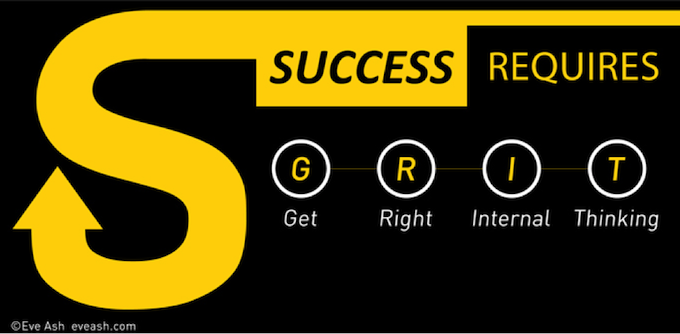
There are articles bubbling everywhere on the importance of developing true grit. This is because an American academic Angela Duckworth has been busy publishing and speaking on her research that effort-PLUS matters more in achieving success than talent or intelligence.
In a sense, there’s little new about grit: Thomas Edison affirmed well over a century ago that genius is 1% inspiration and 99% perspiration. More recently, Malcolm Gladwell chimed in that 10,000 hours spent practising whatever you care to name adds up to mastery of that particular area. Grit sounds like a synonym for conscientious; Duckworth clarifies that grit is a combination of perseverance and passion.
Being human, most of us love the thought of short-cuts. If it comes to passion, we like to think it takes just one strike of the match and we’re off and running. Generally speaking, nevertheless, we have to put in the hard yards if the success we strive for is going to mean anything.
Optimal GRIT = Get Internal Thinking Right
Apply this formula and that “marathon” you’ve assigned yourself is already becoming achievable.
It starts with rewriting your internal scripts, those ones that say:
“I’m no good at this”
It may be because so far you’re experiencing difficulty and a strong urge to throw in the towel. Your efforts are revealing your lack of expertise or talent or both. The trouble with all this talk of grit is that it’s stodgy and unimaginative (“Just do it”, over and over, yada yada…..) Struggling in this way is the equivalent of banging your head on a wall until the wall falls over. Sometimes you need to approach a challenge differently. Get some advice about alternative or lateral ways to master that tricky area. Once you find one that makes sense, then this first script is already being rewritten. You’ll feel motivated when you see the difference in what you’re practising.
“No-one supports what I’m doing”
There will always be naysayers. Some do it because they fear you will be hurt, others because they are habitually judgmental. If you really believe and have evidence that you’re on the right path, seek people who encourage you or think the same way and who are pursuing similar if not identical goals. They may be further down the path than you and willing to give you the benefit of their knowledge and experience. Tear up that internal script as it will only drag you down and make you focus on what you are NOT getting rather than what YOU CAN DO!
“I’m too old / ethnic / (fe)male / a….” (you fill in the gap)
This “script” calls for a very big mental middle finger. Granted, in these pressured times, people opt for safe and predictable choices, particularly when hiring or firing. It’s demoralising. After a while, you wonder how many more rejections can a person take? But remember, your age / gender / race / sexuality (etc) have nothing to do with inability. GRIT calls for defiance.
Rejections are rubbish – don’t accept them
Think of that grit mountain, the late and certainly great Muhammad Ali who said: “I hated every minute of training, but I said ‘Don’t quit. Suffer now and live the rest of your life as a champion.'”
Grit to change or close a door … and open a new one
Grit as a major criterion for success does call for a big pinch of realism. Occasionally we need to realise when a vocation or relationship or career we’ve pursued results in a dead end. This knowledge can be very bitter, particularly if years, energies, finances and training have been invested. It takes grit however to recognise, understand and accept this. And even greater grit to pick yourself up, look around and inwardly, then decide on a new course of action.
Analyse what went wrong without too much self-blame and take heart that there are always opportunities elsewhere, when you least expect them. When success rewards a determined switch in a more fruitful direction, sip it and keep chugging.
Eve Ash is a psychologist, author, filmmaker, public speaker and entrepreneur. She runs Seven Dimensions, a company specialising in training resources for the workplace. See the rest of Eve’s blogs here.


COMMENTS
SmartCompany is committed to hosting lively discussions. Help us keep the conversation useful, interesting and welcoming. We aim to publish comments quickly in the interest of promoting robust conversation, but we’re a small team and we deploy filters to protect against legal risk. Occasionally your comment may be held up while it is being reviewed, but we’re working as fast as we can to keep the conversation rolling.
The SmartCompany comment section is members-only content. Please subscribe to leave a comment.
The SmartCompany comment section is members-only content. Please login to leave a comment.